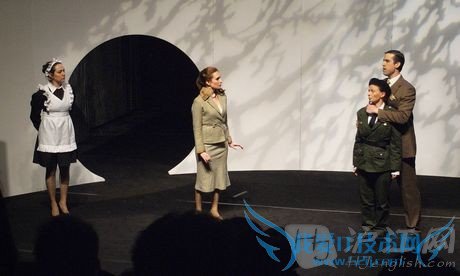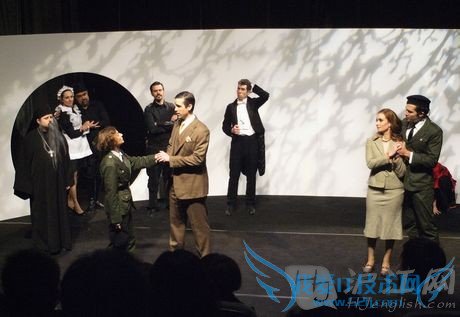��ӭ������52ijӢ��������������С��Ϊ�������Ӣ��֪ʶ�ǣ���������������ɯʿ����ϲ�硶��ʮ��ҹ��Ӣ�İ�����(��ͼ��Ƶ)������������ϸ�ķ�����
������������ɯʿ����ϲ�硶��ʮ��ҹ��Ӣ�İ�����(��ͼ��Ƶ)

����ֱ�������櫡�����ά櫡�ޱ���� ������ŵ�İ�����
�Ϻ�Ӣ�����SRT���磨Shanghai Repertory Theater��2010-2011�ݳ���ͨ������ɯʿ��������ϲ����ϲ����Ʒ֮һ����ʮ��ҹ����Twelfth Night��Ӣ�İ�����ͷ�ڡ�����Ʒ��3��24����4��3���ڿɡ����������������ݡ� 52ijӢ������Ӣ����Ϊ����ý�����ۿ����ݳ���

����Thomas Caron����Ա˵Ϸ
һ�α��ҵĺ���ʹ��������ޱ����������˹��ʧɢ�����Ƿֱ𱻺��˳嵽�������ǵİ��ߺ���һϵ�еĹ��¡���
��SRT����Ʒ����ʮ��ҹ���У����������ɯʿ����Ϸ���Ե��Ź����������źͳ������ϵĹ��±��趨����1939���ŷ�ޣ��ڶ��������ս��ҹ����

����ʮ��ҹ�� ��������������Ը����
���顢���顢���飻��ɬ����������������������ʮ��ҹ����һ������Ŀ�Ҿ��Եľ�����Ʒ��������ÿ���˶����Ŵ���Ķ���ޱ���������˰���ŵ������ŵ�����˰���ά櫣�������ά櫰�����ޱ�����ٰ��������¡���
���ص���̨��רҵ�ĸ�����Ա���Ͼ���ḻ�ĵ��ݣ�����ʮ��ҹ�������չ����ɯʿ����Ϸ�������Ķ����ԡ������Ժ�����������
��Ƶ�ɷô��ҿ���һҳ >>
52ijӢ������Ӣ�����ר���˱���ĵ��ݣ�Thomas Caron���������ˣ�Rosita L. Janbakhsh�����˽��˸���������ݡ�
52ijӢ������Ӣ����ߣ����е���Ա����רҵ����
������: Well they're all professionally-trained, but they don't work here as professional actors because you can't really work in Shanghai as a professionally performing actor - there just isn't enough work. You know, it's not like in the west, in LA or New York, you just act all the time or you go to auditions all the time. It's just, the system isn't, like, it's still developing here, in that way, for foreign actors and stuff like that. So they all have other things that they do. So they come and they rehearse after work and everything like that.
���Ƕ����ܹ�רҵѵ������Ա�������ǵĹ���������Ա������ƽʱ���Լ��Ĺ�����ҵ��ʱ������������
52ijӢ������Ӣ����ߣ�����Ϊ��ѡ���ˡ���ʮ��ҹ���ⲿ��Ʒ�أ�
������: Well every year we do a Shakespeare and last year we did King Lear, and this year we decided, because we did a tragedy last year we wanted to do a comedy. And one of my favorite comedies and also the Director's is Twelfth Night. So we chose this one because it's one of the funniest shows, it's very entertaining, and then he came up with the idea of "well let's set it in the time period of 1939 in Europe". And I thought, oh, that's a great idea. And it just kind of fit with the play. Because in the play, you almost have, in the play, there's a lot of kind of crazy things happening, and some of them very, very silly - almost like they couldn't be happening in real life. And in Europe, in 1939, it was right before World War II started, and so it's kind of like what we say in english: "the calm before the storm". And so this play is kind of like a representation of that. It's like the calm before the storm of the volcano erupting, meaning World War II starting.
ÿ�����ǻ���ɯʿ���ǵ�Ϸ�磬ȥ�����������DZ��硶������������Խ������Ǿ�������ϲ�硣�Һ͵�����ϲ����ϲ�綼�ǡ���ʮ��ҹ��������ɯʿ��������Ȥ��ϲ��֮һ�������и��뷨�����罫�����趨��1939���ŷ�ޣ��Ҿ����Ǹ������⡣��Ϸ���У�����������dz������������¶�������
52ijӢ������Ӣ����ߣ�Ϊ�Ρ���ʮ��ҹ���У����˹��İ���ת����˿�ͳ��������أ�
���ݣ�The interesting thing about this play is that everybody wants to be loved. This is why I put the play, we do it different in Chinese. But we put it in 1939 in Eureope, just a few months before World War II. Because everybody they just want to be in love. It's kind of crazy in love. So why? And may be because there was a war coming, something is happening they didn't want to talk about. They want to pretend it's not there. So that's really kind of the truth. It is only one character of the play who loves. He's not gonna to be loved. He loves. The pirate, Antonio, and he loves Sebastian, Viola's brother. He loves him. He is not asking for anything, right? And then, in the play he's left alone. It's kind of sad. Some people say oh, they are gay. But it doesn't make any difference. The important thing is that he loves, he really loves him. And, to me he is the nicest people in the play, even though he is a pirate. Because he does not look for people to give him something; he just wants to love Sebastian.
������к���Ȥ��һ���¾��ǣ�ÿ���˶������������Ұ�ʱ���趨����1939���ŷ�ޣ����ڵڶ��������ս�С����Dz���ȥ����ս�������ӱܡ��ھ��У�Ψһһ��ȥ���Ľ�ɫ�ǰ�����£�����Ҫ��ʲô��ֻ��ȥ�������Ҷ��ԣ����Ǿ�����õ��ˡ�
52ijӢ������Ӣ����ߣ�����ʮ��ҹ������Ҫ�IJ�����ʲô��
���ݣ�It's two sides of the play: the clowns and the lovers. And to do this play right, you have to balance. And many many times, sometimes, the lovers are the strongest part of the play��and sometimes, the clowns are the strongest part of the play. For me, I love the lovers. People would laugh at anything. The cast is very good and very strong. For me, this play is about two women, Viola, the woman he falls in love with, and Olivia. Other people will say they are too different. "Viola" and "Olivia", the same letters. Shakeespeare is telling you something here. His women are very much the same. They both sad; they both lonely; they both have brothers who die. They're both very very intelligent. They're really attractive to each other. Other people see it differently.
�ⲿϷ��������Ҫ�ķ��棬����Ǻ������ǡ�����������ʱ������Ҫȥƽ���������档������˵����ϲ�����˵��Dz��֣�����Ϊ�ⲿϷ�ǹ���������Ů���ǵġ���ޱ�����Ͱ���ά櫣����������ͬ������ơ�
����ʮ��ҹ�������Ǹ�ʲô���Ĺ��� >>
- �����б����������۽������ѱ�����˿���������������վͬ����۵��֤ʵ��������
-
